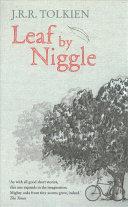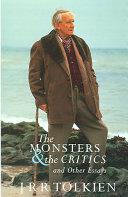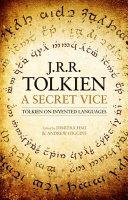Works
On Fairy-Stories
John Ronald Reuel Tolkien
Leaf by Niggle
John Ronald Reuel Tolkien
The Monsters and the Critics
John Ronald Reuel TolkienThe Lord of the Rings
John Ronald Reuel Tolkien
The Hobbit
John Ronald Reuel TolkienThe Fellowship of the Ring
John Ronald Reuel TolkienThe Silmarillion
John Ronald Reuel Tolkien
A Secret Vice
John Ronald Reuel TolkienFamous John Ronald Reuel Tolkien Quotes
Tolkien in Oxford (1968) http://www.bbc.co.uk/archive/writers/12237.shtml, a BBC 2 television documentary (at 21:49)
Leaf by Niggle (1945)
John Ronald Reuel Tolkien Quotes about time
Letter to his publisher (31 July 1947); published in The Letters of J.R.R. Tolkien (1981), Letter 109
One of two draft letters (25 July, 1938) written for Stanley Unwin to select as a response to his German publishers inquiry about his ancestry. The other letter refused to answer altogether on his ancestry; since the quoted letter persists, it seems that the other letter was sent.
The Letters of J. R. R. Tolkien (1981)
"Alboin Errol", in The Lost Road (1987). Compare this with "The lyf so short, the craft so longe to lerne" by Geoffrey Chaucer
"A Philologist on Esperanto" in The British Esperantist (May 1932).
Years later, in a 1956 letter (quoted more extensively below) he stated that Esperanto and other constructed languages were "dead, far deader than ancient unused languages, because their authors never invented any Esperanto legends."
John Ronald Reuel Tolkien Quotes about the world
No. 247: To Colonel Worskett (20 September 1963)
The Letters of J. R. R. Tolkien (1981)
Context: PIPPIN: I didn't think it would end this way.
GANDALF: End? No, the journey doesn't end here. Death is just another path, one that we all must take. The grey rain-curtain of this world rolls back, and all turns to silver glass, and then you see it.
PIPPIN: What? Gandalf? See what?
GANDALF: White shores, and beyond, a far green country under a swift sunrise.
PIPPIN: Well, that isn't so bad.
GANDALF: No. No, it isn't.
To Christopher Tolkien in South Africa
The Letters of J. R. R. Tolkien (1981)
No. 142: letter to his friend Robert Murray, S.J. (December 1953)
The Letters of J. R. R. Tolkien (1981)
On Fairy-Stories (1939)
John Ronald Reuel Tolkien: Trending quotes
“That there’s some good in this world. And it’s worth fighting for.”
Context: Frodo : What are we holding on to, Sam?
Sam: That there’s some good in this world, Mr. Frodo. And it’s worth fighting for
John Ronald Reuel Tolkien Quotes
About "Leaf by Niggle", in a letter to Caroline Everett (24 June 1957)
Context: I should say that, in addition to my tree-love (it was originally called The Tree), it arose from my own pre-occupation with the Lord of the Rings, the knowledge that it would be finished in great detail or not at all, and the fear (near certainty) that it would be 'not at all'. The war had arisen to darken all horizons. But no such analyses are a complete explanation even of a short story...
Letter (September 1944)
Source: J.R.R. Tolkien, The Silmarillion
“That story was the only thing I have ever done which cost me absolutely no pains at all.”
About "Leaf by Niggle", in a letter to Stanley Unwin (18 March 1945)
Context: That story was the only thing I have ever done which cost me absolutely no pains at all. Usually I compose only with great difficulty and endless rewriting. I woke up one day (more than 2 years ago) with that odd thing virtually complete in my head. It took only a few hours to get down, and then copy out.
“The Evangelium has not abrogated legends; it has hallowed them, especially the "happy ending."”
The Christian has still to work, with mind as well as body, to suffer, hope, and die; but he may now perceive that all his bents and faculties have a purpose, which can be redeemed. So great is the bounty with which he has been treated that he may now, perhaps, fairly dare to guess that in Fantasy he may actually assist in the effoliation and multiple enrichment of creation. All tales may come true; and yet, at the last, redeemed, they may be as like and unlike the forms that we give them as Man, finally redeemed, will be like and unlike the fallen that we know.
On Fairy-Stories (1939)
“The news today about "Atomic bombs" is so horrifying one is stunned.”
No. 102: From a letter to his son Christopher Tolkien (9 August, 1945)
The Letters of J. R. R. Tolkien (1981)
Context: The news today about "Atomic bombs" is so horrifying one is stunned. The utter folly of these lunatic physicists to consent to do such work for war-purposes: calmly plotting the destruction of the world! Such explosives in men's hands, while their moral and intellectual status is declining, is about as useful as giving out firearms to all inmates of a gaol and then saying that you hope "this will ensure peace". But one good thing may arise out of it, I suppose, if the write-ups are not overheated: Japan ought to cave in. Well we're in God's hands. But He does not look kindly on Babel-builders.
On Fairy-Stories (1939)
Context: I have claimed that Escape is one of the main functions of fairy-stories, and since I do not disapprove of them, it is plain that I do not accept the tone of scorn or pity with which 'Escape' is now so often used. Why should a man be scorned if, finding himself in prison, he tries to get out and go home? Or if he cannot do so, he thinks and talks about other topics than jailers and prison-walls? The world outside has not become less real because the prisoner cannot see it.
On Fairy-Stories (1939)
Context: The Evangelium has not abrogated legends; it has hallowed them, especially the "happy ending." The Christian has still to work, with mind as well as body, to suffer, hope, and die; but he may now perceive that all his bents and faculties have a purpose, which can be redeemed. So great is the bounty with which he has been treated that he may now, perhaps, fairly dare to guess that in Fantasy he may actually assist in the effoliation and multiple enrichment of creation. All tales may come true; and yet, at the last, redeemed, they may be as like and unlike the forms that we give them as Man, finally redeemed, will be like and unlike the fallen that we know.
“My political opinions lean more and more to Anarchy”
Letter to his son Christopher Tolkien (29 November, 1943) <!-- No. 64? -->
The Letters of J. R. R. Tolkien (1981)
Context: My political opinions lean more and more to Anarchy (philosophically understood, meaning abolition of control not whiskered men with bombs) … the most improper job of any man, even saints (who at any rate were at least unwilling to take it on), is bossing other men. Not one in a million is fit for it, and least of all those who seek the opportunity.
“But the real soul-mate is the one you are actually married to.”
Letter to Michael Tolkien (March 1941)
Context: Nearly all marriages, even happy ones, are mistakes: in the sense that almost certainly (in a more perfect world, or even with a little more care in this very imperfect one) both partners might be found more suitable mates. But the real soul-mate is the one you are actually married to.
“Nearly all marriages, even happy ones, are mistakes”
Letter to Michael Tolkien (March 1941)
Context: Nearly all marriages, even happy ones, are mistakes: in the sense that almost certainly (in a more perfect world, or even with a little more care in this very imperfect one) both partners might be found more suitable mates. But the real soul-mate is the one you are actually married to.
No. 45: To his son Michael Tolkien (09 June, 1941)
The Letters of J. R. R. Tolkien (1981)
Context: I have in this War a burning private grudge — which would probably make me a better soldier at 49 than I was at 22: against that ruddy little ignoramus Adolf Hitler (for the odd thing about demonic inspiration and impetus is that it in no way enhances the purely intellectual stature: it chiefly affects the mere will). Ruining, perverting, misapplying, and making for ever accursed, that noble northern spirit, a supreme contribution to Europe, which I have ever loved, and tried to present in its true light.
“The moment disbelief arises, the spell is broken; the magic, or rather art, has failed.”
On Fairy-Stories (1939)
Context: The story-maker proves a successful 'sub-creator'. He makes a Secondary World which your mind can enter. Inside it, what he relates is 'true': it accords with the laws of that world. You therefore believe it, while you are, as it were, inside. The moment disbelief arises, the spell is broken; the magic, or rather art, has failed.
No. 30: Letter to Stanley Unwin (25 July, 1938); Tolkien's German publishers had written to ask him whether he was of "Aryan" origin.
The Letters of J. R. R. Tolkien (1981)
Context: I must say the enclosed letter from Rütten and Loening is a bit stiff. Do I suffer this impertinence because of the possession of a German name, or do their lunatic laws require a certificate of 'arisch' origin from all persons of all countries? … I do not regard the (probable) absence of all Jewish blood as necessarily honourable; and I have many Jewish friends, and should regret giving any colour to the notion that I subscribed to the wholly pernicious and unscientific race-doctrine.
“The significance of a myth is not easily to be pinned on paper by analytical reasoning.”
"Beowulf: The Monsters and the Critics" (1936), p. 14
Context: The significance of a myth is not easily to be pinned on paper by analytical reasoning. It is at its best when it is presented by a poet who feels rather than makes explicit what his theme portends; who presents it incarnate in the world of history and geography, as our poet has done. Its defender is thus at a disadvantage: unless he is careful, and speaks in parables, he will kill what he is studying by vivisection, and he will be left with a formal or mechanical allegory, and what is more, probably with one that will not work. For myth is alive at once and in all its parts, and dies before it can be dissected.
Interview http://www.lordotrings.com/interview.asp with Dennis Gerrolt, first broadcast on the BBC Radio 4 programme "Now Read On" (January 1971)
Context: It gives me great pleasure, a good name. I always in writing start with a name. Give me a name and it produces a story, not the other way about normally.
“For myth is alive at once and in all its parts, and dies before it can be dissected.”
"Beowulf: The Monsters and the Critics" (1936), p. 14
Context: The significance of a myth is not easily to be pinned on paper by analytical reasoning. It is at its best when it is presented by a poet who feels rather than makes explicit what his theme portends; who presents it incarnate in the world of history and geography, as our poet has done. Its defender is thus at a disadvantage: unless he is careful, and speaks in parables, he will kill what he is studying by vivisection, and he will be left with a formal or mechanical allegory, and what is more, probably with one that will not work. For myth is alive at once and in all its parts, and dies before it can be dissected.
On Fairy-Stories (1939)
Context: The mind that thought of light, heavy, grey, yellow, still, swift also conceived of magic that would make heavy things light and able to fly, turn grey lead into yellow gold, and the still rock into a swift water. If it could do the one, it could do the other; it inevitably did both. When we can take green from grass, blue from heaven, and red from blood, we have already an enchanter's power.
On Fairy-Stories (1939)
Context: The Gospels contain a fairy-story, or a story of a larger kind which embraces all the essence of fairy-stories. … But this story has entered History and the primary world; … It has pre-eminently the "inner consistency of reality." There is no tale ever told that men would rather find was true, and none which so many sceptical men have accepted as true on its own merits. For the Art of it has the supremely convincing tone of Primary Art, that is, of Creation.... this story is supreme; and it is true. Art has been verified. God is the Lord, of angels, and of men — and of elves. Legend and History have met and fused.
No. 165: To Houghton Mifflin Co. (30 June, 1955); also quoted in 'Tolkien on Tolkien' in Diplomat magazine (October 1966).
The Letters of J. R. R. Tolkien (1981)
Letter to Deborah Webster (25 October 1958)
“I have the hatred of apartheid in my bones…”
Valedictory address to the University of Oxford (1959)
English and Welsh (1955)
“Power' is an ominous and sinister word in all these tales, except as applied to the gods.”
No. 131: letter to Milton Waldman (c. 1951)
The Letters of J. R. R. Tolkien (1981)
English and Welsh (1955)
“Every morning I wake up and think good, another 24 hours' pipe-smoking.”
A rare interview with Tolkien (1966) — "Tolkien's shire" by John Ezard, The Guardian (28 December 1991) http://www.theguardian.com/books/1991/dec/28/jrrtolkien.classics
“A story must be told or there'll be no story, yet it is the untold stories that are most moving.”
Letter to his son Christopher (30 January 1945) — in The Letters of J.R.R. Tolkien (1981), p. 110
The Letters of J. R. R. Tolkien (1981)
No. 180: To a Mr. Thompson (incomplete draft of a letter, 1956).
The Letters of J. R. R. Tolkien (1981)
English and Welsh (1955)
Source: Letter to his son, Christopher (30 January 1945); published in The Letters of J.R.R. Tolkien (1981), Letter 96
Letter to Edith, as quoted in J. R. R. Tolkien: a biography (1977) by Humphrey Carpenter, p. 66
English and Welsh (1955)
On Fairy-Stories (1939)
No. 163: On his discovery of Finnish language, in a letter to W. H. Auden (1955)
The Letters of J. R. R. Tolkien (1981)
“Wars are not favourable to delicate pleasures.”
"A Secret Vice" (lecture, 1931) published in The Monsters And The Critics And Other Essays (1983), edited by Christopher Tolkien
But it is, of course, a constant source of consolation and pleasure to me. And, I may say, a piece of singular good fortune, much envied by some of my contemporaries. Wonderful people still buy the book, and to a man 'retired' that is both grateful and comforting.
No. 165: To Houghton Mifflin Co. (30 June, 1955); also quoted in 'Tolkien on Tolkien' in Diplomat magazine (October 1966).
The Letters of J. R. R. Tolkien (1981)
“I liked him better than all the other characters, and much more so than Frodo.”
Speaking of Gollum. From J. R. R. Tolkien: An Audio Portrait, BBC Radio Collection (2001), ISBN 0-563-53692-6. CD 1, track 17.
“I think we shall have to give the region a name. What do you propose?”
"The Porter settled that some time ago," said the Second Voice. "Train for Niggle's Parish in the bay."
Leaf by Niggle (1945)
Source: The Letters of J. R. R. Tolkien (1981), No. 52: To his son Christopher Tolkien (29 November, 1943)
“I would rather spend one lifetime with you, than face all the ages of this world alone.”
Source: The Lord of the Rings, The Fellowship of the Ring
